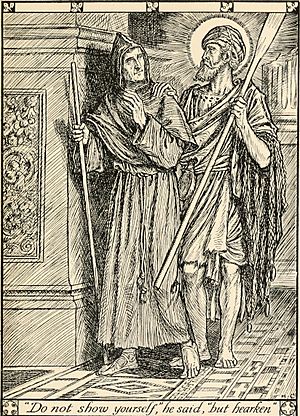William Canton facts for kids
William Canton (born October 27, 1845 – died May 2, 1926) was a British poet, journalist, and writer. He is best known today for his books for children. These include a series of three books that started with The Invisible Playmate. He wrote these books for his daughter, Winifred Vida (1891-1901). During his life, Canton was also known for using new discoveries about ancient history in his poems.
Life Story
William Canton was born in Chusan, China. His family worked for the government, and they were Catholic. He spent most of his childhood in Jamaica. He studied to become a priest in France, but he later decided not to follow that path. Instead, he became a teacher and a writer. He also changed from being Catholic to being Protestant.
Canton worked as a journalist in London and Glasgow. He became the editor of the Glasgow Weekly Herald. Later, he was a main writer for The Herald newspaper in Glasgow.
In 1891, Canton moved to London. He worked for a company that published religious books and magazines called W. Isbister. He later became the editor of Sunday Review and Sunday Magazine. He also wrote articles and poems for a magazine called Good Words.
In 1901, something very sad happened: Canton's daughter, Winifred, passed away suddenly when she was only 10 years old. He left his job at Isbister. He decided to write the official history of the Bible Society, hoping it would help him feel better. This history was very long, with nine books, and it took him five years to finish. He also wrote more books about Winifred, including The Invisible Playmate, W.V.: Her Book, and Rhymes About a Little Woman. These books shared his memories of his daughter.
Canton finished his big history project in 1910. After that, he focused on writing books for children and historical works. Some of these books include The Bible and the Anglo-Saxon People (1914) and The Bible Story (1915).
His Poetry
William Canton's early poems were very well-liked during his lifetime. He tried to include new scientific ideas, like Charles Darwin's theory of evolution, in his poetry. He wrote about this in his poem Through the Ages (1879). A famous scientist named Thomas Huxley supported Canton's efforts to use scientific words in his poems.
Max Müller, a scholar who studied ancient Indian languages, also praised Canton's work. He said Canton's poems were as good as those by another famous poet, Matthew Arnold. Walter Pater, another writer, told Canton that he was very good at writing about "primeval" or "pre-historic" topics. He felt Canton truly captured the poetic side of these ancient subjects.
Canton's later poems focused more on religious themes. However, he wrote much less after his daughter passed away. In 1913, Canton started a new religious poem called The Mask of Veronica, but he did not finish it before he died.
His Books
- A Lost Epic and other poems (1887)
- The fairy princess, and other poems
- The Invisible Playmate: A Story of the Unseen (1894)
- W. V. Her Book (1896)
- W. V's Golden Legend (1898)
- A Child's Book of Saints (1898)
- Children's sayings : edited with a digression on the small people (1900)
- In memory of W. V. (1901)
- The Comrades (1902) poems
- A history of the British and Foreign Bible Society, 5 volumes (1904-1910).
- The Bible and the Anglo-Saxon People (1914)
- Poems (1927, Harrap)
- A Child's Book of Warriors (1912) illustrated by Herbert Cole
- Poems of Today (1915), p. xix of biographical notes to later editions.


